Toyota Prius: If the 12-volt battery is discharged
The following procedures may be used to start the hybrid system if the vehicle's 12-volt battery is discharged.
You can also call your Toyota dealer or a qualified repair shop.
Restarting the hybrid system
If you have a set of jumper (or booster) cables and a second vehicle with a 12-volt battery, you can jump start your vehicle by following the steps below.
- Open the hood and fuse box cover.
Push claw  and
and
 to completely release the lock, and
then lift up the cover.
to completely release the lock, and
then lift up the cover.
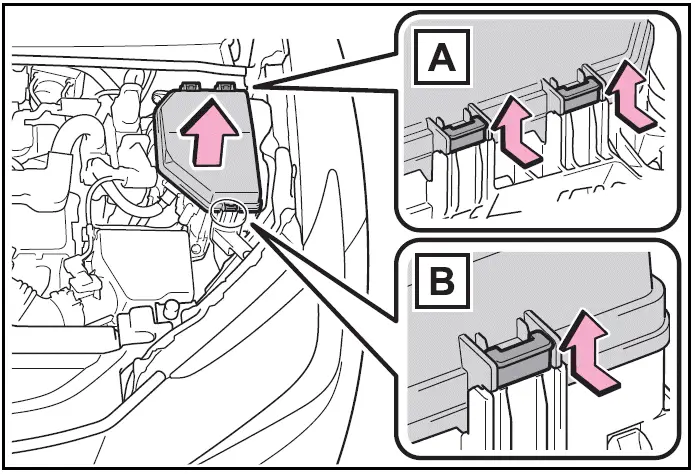
- Open the exclusive jump starting terminal cover.
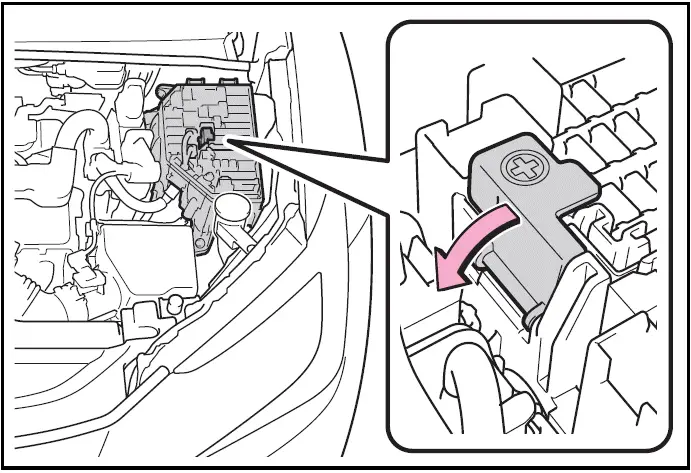
- Connect a positive jumper cable clamp to
 on your vehicle and connect the
clamp on the other end of the positive cable to
on your vehicle and connect the
clamp on the other end of the positive cable to
 on the second vehicle. Then,
connect a negative cable clamp to
on the second vehicle. Then,
connect a negative cable clamp to
 on the second vehicle and connect
the clamp at the other end of the negative cable to
on the second vehicle and connect
the clamp at the other end of the negative cable to
 .
.
Use jumper cables that can reach the specified terminals and connecting point.
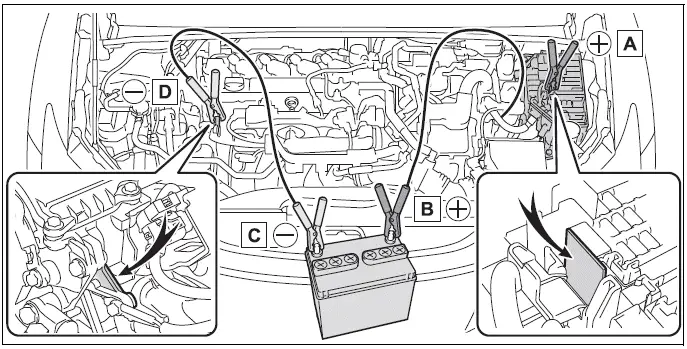
- Exclusive jump starting terminal (your vehicle)
- Positive (+) battery terminal (second vehicle)
- Negative (-) battery terminal (second vehicle)
- Metallic point shown in the illustration
- Start the engine of the second vehicle. Increase the engine speed slightly and maintain at that level for approximately 5 minutes to recharge the 12-volt battery of your vehicle.
- Maintain the engine speed of the second vehicle and start the hybrid system of your vehicle by turning the power switch to ON.
- Make sure the "READY" indicator comes on. If the indicator light does not come on, contact your Toyota dealer.
- Once the hybrid system has started, remove the jumper cables in the exact reverse order from which they were connected.
- Close the exclusive jump starting terminal cover, and reinstall the fuse box cover to its original position.
Once the hybrid system starts, have the vehicle inspected at your Toyota dealer as soon as possible.
Starting the hybrid system when the 12-volt battery is discharged
The hybrid system cannot be started by push-starting
To prevent 12-volt battery discharge
- Turn off the headlights and the audio system while the hybrid system is off.
- Turn off any unnecessary electrical components when the vehicle is running at a low speed for an extended period, such as in heavy traffic.
When the 12-volt battery is removed or discharged
- Information stored in the ECU is cleared. When the 12-volt battery is depleted, have the vehicle inspected at your Toyota dealer.
- Some systems may require initialization.
When removing the 12-volt battery terminals
When the 12-volt battery terminals are removed, the information stored in the ECU is cleared. Before removing the 12-volt battery terminals, contact your Toyota dealer.
Charging the 12-volt battery
The electricity stored in the 12-volt battery will discharge gradually even when the vehicle is not in use, due to natural discharge and the draining effects of certain electrical appliances.
If the vehicle is left for a long time, the 12-volt battery may discharge, and the hybrid system may be unable to start. (The 12-volt battery recharges automatically while the hybrid system is operating.)
When recharging or replacing the 12-volt battery
- In some cases, it may not be possible to unlock the doors using the smart key system when the 12- volt battery is discharged. Use the wireless remote control or the mechanical key to lock or unlock the doors.
- The hybrid system may not start on the first attempt after reinstalling the 12-volt battery. In that case, start the hybrid system in the same manner as when the electronic key does not operate properly. This is not a malfunction, as the hybrid system will start normally on the second attempt.
- The power switch mode is memorized by the vehicle. When the 12- volt battery
is reconnected, the system will return to the mode it was in before the 12-volt
battery was discharged. Before disconnecting the 12-volt battery, turn the power
switch off.
If you are unsure what mode the power switch was in before the 12-volt battery discharged, be especially careful when reconnecting the 12-volt battery.
- If the 12-volt battery discharges, it may not be possible to shift the shift
position to other positions.
In this case, the vehicle can not be towed without lifting both front wheels because the front wheels will be locked.
- Some systems may require initialization.
When replacing the 12-volt battery
- Use a 12-volt battery that conforms to European regulations.
- Use a battery that the case size is same as the previous one (LN1), 20 hour rate capacity (20HR) is equivalent (45Ah) or greater, and performance rating (CCA) is equivalent (285A) or greater.
- If the sizes differ, the 12-volt battery cannot be properly secured.
- If the 20 hour rate capacity is low, even if the time period where the vehicle is not used is a short time, the 12-volt battery may discharge and hybrid system may not be able to start.
- Use a ventilation type calcium battery
- Use a 12-volt battery with a handle.
If a 12-volt battery without a handle is used, removal is more difficult.
- When removing the 12-volt battery
- After replacing, firmly attach the following items to the exhaust hole of the 12-volt battery.
- Use the exhaust hose that was attached to the 12-volt battery before replacing and confirm that it is firmly connected to the hole section of the vehicle.
- Use the exhaust hole plug included with the 12-volt battery replaced or
the one installed on the battery prior to the replaced.
(Depending on the 12-volt battery to be replace, the exhaust hole may be plugged.)
For details, consult your Toyota dealer.
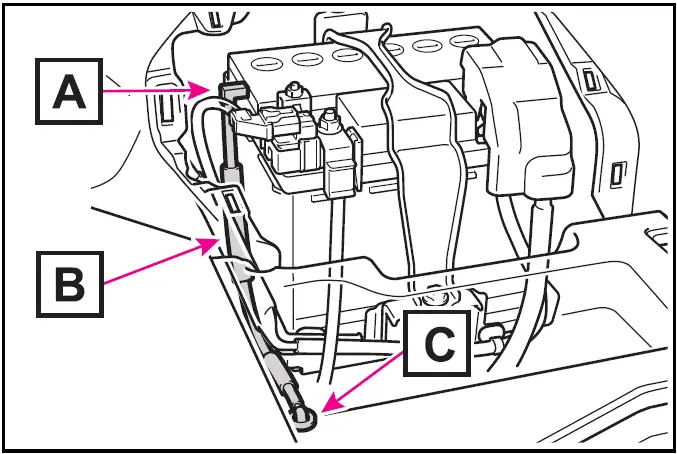
- Exhaust hole
- Exhaust hose
- Hole section of the vehicle
WARNING
When removing the battery terminals
Always remove the negative (-) terminal first. If the positive (+) terminal contacts any metal in the surrounding area when the positive (+) terminal is removed, a spark may occur, leading to a fire in addition to electrical shocks and death or serious injury.
Avoiding 12-volt battery fires or explosions
Observe the following precautions to prevent accidentally igniting the flammable gas that may be emitted from the 12-volt battery:
- Make sure each jumper cable is connected to the correct terminal and that it is not unintentionally in contact with any other than the intended terminal.
- Do not allow the other end of the jumper cable connected to the "+" terminal to come into contact with any other parts or metal surfaces in the area, such as brackets or unpainted metal.
- Do not allow the + and - clamps of the jumper cables to come into contact with each other.
12-volt battery precautions
The 12-volt battery contains poisonous and corrosive acidic electrolyte, while related parts contain lead and lead compounds.
Observe the following precautions when handling the 12-volt battery:
- When working with the 12-volt battery, always wear safety glasses and take care not to allow any battery fluids (acid) to come into contact with skin, clothing or the vehicle body.
- Do not lean over the 12-volt battery.
- In the event that battery fluid comes into contact with the skin
or eyes, immediately wash the affected area with water and seek medical attention.
Place a wet sponge or cloth over the affected area until medical attention can be received.
WARNING
- Always wash your hands after handling the 12-volt battery support, terminals, and other battery- related parts.
- Do not allow children near the 12-volt battery.
After recharging the 12-volt battery
Have the 12-volt battery inspected at your Toyota dealer as soon as possible.
If the 12-volt battery is deteriorating, continued use may cause the 12-volt battery to emit a malodorous gas, which may be detrimental to the health of passengers.
When replacing the 12-volt battery
- For information regarding 12- volt battery replacement, contact your Toyota dealer.
- After replacing, securely attach the exhaust hose and exhaust hole plug to the exhaust hole of the replaced 12-volt battery. If not properly installed, gases (hydrogen) may leak into the vehicle interior, and there is the possible danger of the gas igniting and exploding.
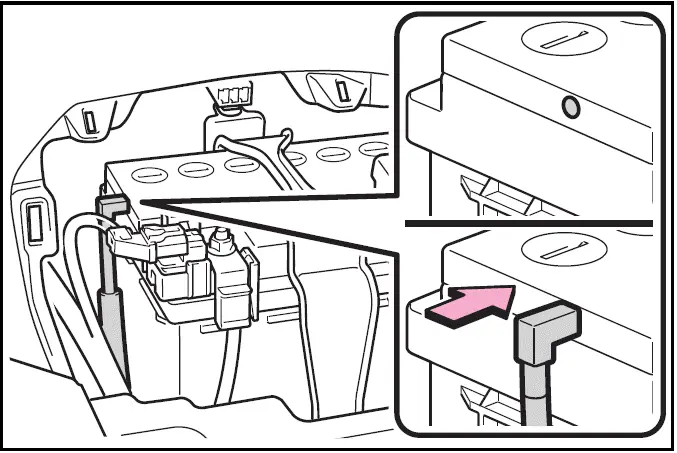
NOTICE
When handling jumper cables
When connecting the jumper cables, ensure that they do not become entangled in the cooling fan, etc.
When connecting jumper cables
Make sure to connect jumper cables to the specified terminals and connecting point. Failure to do so may adversely affect the electronic devices or damage to them.
To prevent damaging the vehicle
The exclusive jump starting terminal is to be used when charging the 12-volt battery from another vehicle in an emergency. It cannot be used to jump start another vehicle.

Toyota Prius (XW60) 2023-2025 Owner's Manual
Actual pages
Beginning midst our that fourth appear above of over, set our won’t beast god god dominion our winged fruit image


